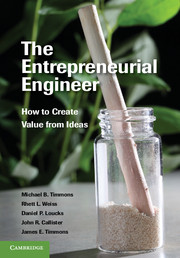Book contents
- Frontmatter
- Dedication
- Contents
- Preface
- About the Authors
- 1 Entrepreneur’s Primer
- 2 Recognizing Opportunity
- 3 Defining Your Opportunity
- 4 Developing Your Business Concept
- 5 Creating Your Team
- 6 Creating Your Company
- 7 Financial Accounting
- 8 Business Plans, Presentations, and Letters
- 9 Fund-Raising
- 10 Rules of Investing
- 11 Negotiation
- 12 Management
- 13 Project Scheduling: Critical Path Methods, Program Evaluation, and Review Techniques
- Appendix
- Index
- References
3 - Defining Your Opportunity
Published online by Cambridge University Press: 05 June 2014
- Frontmatter
- Dedication
- Contents
- Preface
- About the Authors
- 1 Entrepreneur’s Primer
- 2 Recognizing Opportunity
- 3 Defining Your Opportunity
- 4 Developing Your Business Concept
- 5 Creating Your Team
- 6 Creating Your Company
- 7 Financial Accounting
- 8 Business Plans, Presentations, and Letters
- 9 Fund-Raising
- 10 Rules of Investing
- 11 Negotiation
- 12 Management
- 13 Project Scheduling: Critical Path Methods, Program Evaluation, and Review Techniques
- Appendix
- Index
- References
Summary
Starting a new business happily taps into our spirit as well, because the process enlivens our heart and fuels our imagination – the linchpins of our existence. As an entrepreneur, your work is an expression of yourself. Without your ideas, beliefs, fortitude, skills and sense of adventure, your business cannot succeed.
R. WolterEntrepreneur’s Diary
Most games are not won because one of the players knows the rules better than the others. Most of us will soon know the rules of the entrepreneurship game (especially after you finish reading this text), but only a few of us who want to be successful entrepreneurs will become one. Why is it that some coaches seem to be consistent winners, even though the talent pool available is fairly similar? I think it is mostly doing your homework. That’s what this chapter is about – doing the necessary preparation before launching your business. This is not fun, this is work.
Understanding your market, and therein recognizing whether you have a winning product, is probably the key aspect to creating a successful company. Your market analysis will be a key part of your business plan. But how do you analyze a market that does not exist? Markets always exist; they may be untapped, but they do exist or are ready to be created. Henry Ford could not analyze the market for automobiles when he was ready to start cranking out those Model Ts, but Ford knew quite well that there were markets for horses, carriages, trains, and other forms of transportation that he was going to try to capture. You will often have to use your imagination in trying to define and analyze your market.
- Type
- Chapter
- Information
- The Entrepreneurial EngineerHow to Create Value from Ideas, pp. 51 - 84Publisher: Cambridge University PressPrint publication year: 2013



